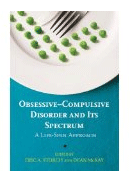“Obsessive-Compulsive Disorder and Its Spectrum: A Life-Span Approach”

“Obsessive-Compulsive Disorder and Its Spectrum: A Life-Span Approach”
By Eric A. Storch and Dean McKay
American Psychological Association
Washington, D.C., 2014
Wide audience could benefit from insightful book about OCD
Reviewed by James K. Luiselli, Ed.D., ABPP, BCBA-D
Obsessive-compulsive disorder is characterized by recurrent and persistent thoughts (obsessions) that co-occur with repetitive behaviors and mental acts (compulsions). Diagnostically, OCD falls within the category of obsessive-compulsive spectrum disorders, a recently established nomenclature that has stirred controversy among clinicians and researchers. The other disorders comprising OCSDs are body dysmorphic disorder, hoarding disorder, trichotillomania (hair-pulling disorder), excoriation (skin-picking) disorder, and substance/medication induced OCD.
“Obsessive-Compulsive Disorder and Its Spectrum” addresses the latest developments in diagnosis, assessment and treatment of OCSDs. Editors Eric A. Storch and Dean McKay are notable academic researchers and skilled clinicians, both with extensive publication records and exemplary scholarship. Their selection of chapters and authors for this book is outstanding and an accurate reflection of how OCD conceptualization and treatment has evolved in recent years.
Section I of the book deals with assessment and psychological treatment. The chapters focus on OCD therapies with children, adults and the elderly, distinct disorders within OCSDs, and related topics such as Tourette’s Disorder, tics and health anxiety. The laudable features of these chapters, which apply throughout the book, are in-depth coverage of evidence-based practices, descriptions of seminal research, lucid interpretation of the contemporary evidence, and suggestions to improve therapeutic outcomes in “real world” settings.
In Part II of the book, chapters highlight the common presentation of clinical comorbidity among OCSDs, specifically depression, suicidal and non-suicidal self-injury and autism spectrum disorder. Much of the information conveyed in these chapters is cutting-edge, including neuroscience and trans-diagnostic treatment research. The authors make evident the need to explore new techniques for properly treating comorbidities in complex cases.
In two additional sections of the book, chapters cover the ever expanding area of pharmacotherapy for the OCSDs and look further into the neuroscientific basis of etiology and developmental psychopathology. Pharmacological treatment, a core therapy for OCD, is explained well with reference to particular classes of medication and brain-behavior interactions. The neuroscience chapters examine the genetics of OCSDs, functional neuroimaging, and neurobiological abnormalities that impact symptom expression.
Quite simply, this is the best book about OCD I have ever read. Storch and McKay solicited chapters from some of the most notable experts in the field, provided an historical content for tracing the new category of OCSDs, integrated findings from multiple disciplines, and synthesized a host of treatment implications and recommendations. All of the chapters are eminently readable, no doubt the result of careful editing and collaboration with the contributing authors.
Students, trainees, clinicians, and researchers should acquire this book and read it cover to cover. Whether you are new to the subject matter, casually familiar with OCD, or an informed professional, there is something to learn from every chapter in the book. Thorough, insightful, and of the highest quality, “Obsessive-Compulsive Disorder and Its Spectrum” will surely advance client care, behavioral healthcare systems, and scientific inquiry now and for years to come.
James K. Luiselli, Ed.D., ABPP, BCBA, is senior vice president, applied research, clinical training and peer review at the May Institute in Norwood, Mass.
Learn more about the book: Obsessive Compulsive Disorder and Its Spectrum: A Life-Span Approach
